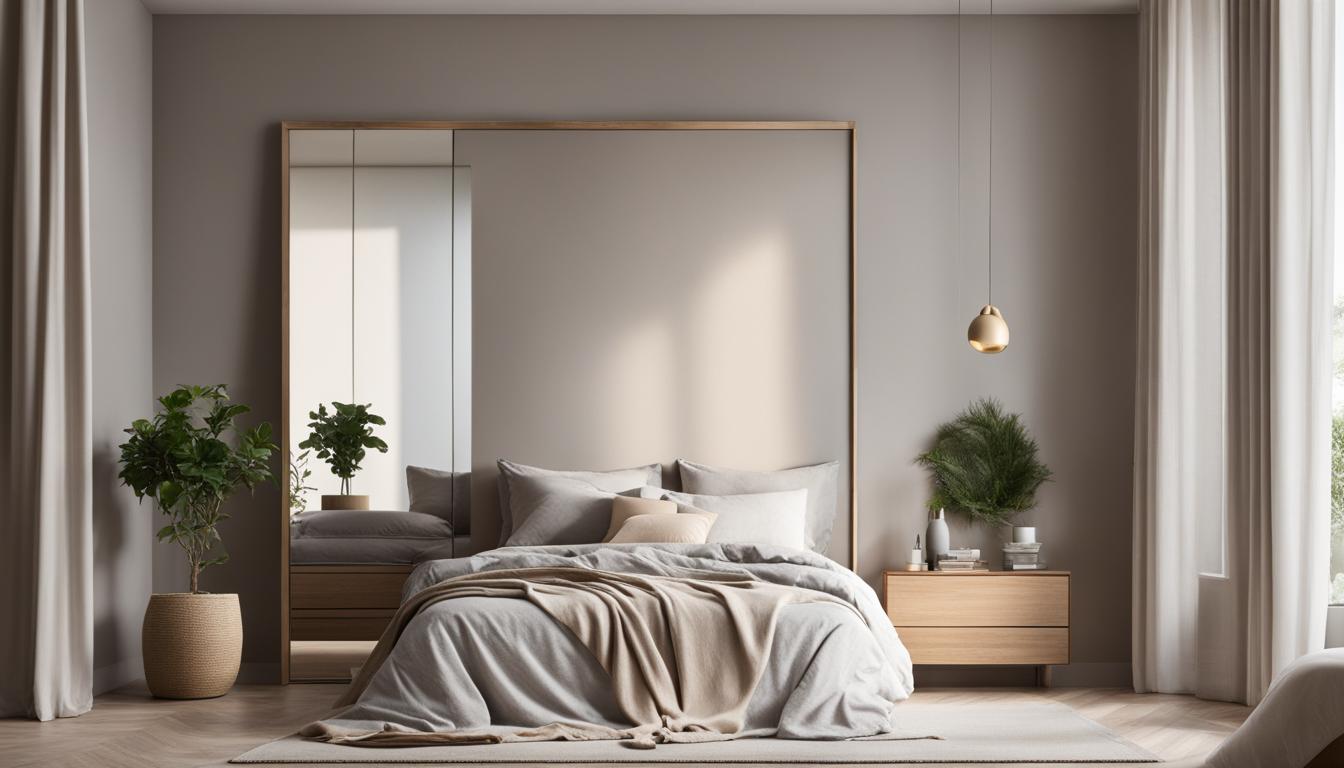Originally posted on October 28, 2023 @ 11:24 pm
Welcome to the world of Feng Shui! If you’re looking to enhance positive energy flow and bring more harmony into your home, you’ve come to the right place. In this article, we will explore the ancient practice of Feng Shui and provide you with practical tips for mirror placement. Mirrors are powerful tools that can help amplify positive energy, but their placement is crucial to ensure optimal results.
Whether you’re looking to promote relaxation in your bedroom, create a sense of spaciousness in your living room, or enhance abundance in your dining area, proper mirror placement is key. By adhering to the principles of Feng Shui mirror placement, you can create a balanced and harmonious environment that supports your physical and emotional well-being.
Key Takeaways:
- Proper mirror placement is crucial to ensure optimal results in Feng Shui.
- Mirrors are powerful tools that can help amplify positive energy in your home.
- Feng Shui mirror placement principles can help create a balanced and harmonious environment.
- Mirrors can be strategically placed in various areas of your home to promote relaxation, create spaciousness, enhance abundance, and support your overall well-being.
- Implementing these techniques can help you create a more harmonious and balanced living space.
Understanding the Principles of Feng Shui Mirror Placement
Feng Shui is an ancient Chinese practice that works with energy flow or chi to create harmony and balance in one’s environment. The placement of mirrors is an integral part of Feng Shui, as mirrors are believed to reflect and redirect energy flow throughout a space.
Before delving into the specific techniques for mirror placement, it’s important to understand the underlying principles of Feng Shui mirror rules. The correct placement of mirrors in Feng Shui can help create a balanced and harmonious environment, while incorrect placement can disrupt the flow of energy and negatively impact one’s well-being.
Understanding the Bagua Map
One of the foundational principles of Feng Shui mirror placement is the Bagua Map. The Bagua Map is a tool used to divide a space into nine different areas, each corresponding to a specific aspect of life, such as wealth, health, and relationships.
Once you have laid out the Bagua Map for your space, you can determine which areas of the room to enhance or balance using mirrors. For example, if your career area is located in the northern section of the room, placing a mirror on the northern wall can help activate and enhance career opportunities.
Correct Placement of Mirrors in Feng Shui
Another important principle of Feng Shui mirror placement is the direction in which the mirror faces. Mirrors should never be placed directly facing the front door, as this is believed to reflect positive energy away from the home. Instead, mirrors should be placed to the side of the front door, reflecting energy inward.
It’s also important to avoid placing mirrors directly facing each other, as this creates a never-ending reflection that can cause confusion and disrupt the natural flow of energy in a space.
When choosing a location for a mirror, it’s essential to consider what it will be reflecting. Mirrors should reflect positive images and objects, as anything negative or cluttered can cause stagnant energy and disrupt the flow of chi.
Conclusion
Understanding the principles of Feng Shui mirror placement is key to creating a harmonious and balanced living space. By utilizing the Bagua Map and considering the direction and location of mirrors, you can enhance positive energy flow and improve the overall well-being of your home.

Mirror Direction in Feng Shui: Enhancing Energy Flow
When it comes to mirror placement in Feng Shui, the direction in which the mirror faces plays a crucial role in enhancing the energy flow within your space. Correct placement of mirrors in Feng Shui can ensure that the positive energy is amplified, and the negative energy is deflected.
The best location for mirrors in Feng Shui is where they can reflect natural light and beautiful views while avoiding reflecting any clutter, sharp corners, or negative elements. This creates a sense of spaciousness and calmness while promoting natural energy flow.
Let’s take a look at some key mirror directions and their influence on energy:
| Mirror Direction | Influence on Energy Flow |
|---|---|
| North | Brings career opportunities and promotes the flow of wealth. |
| South | Attracts fame, recognition, and enhances social connections. |
| East | Enhances family relationships, personal growth, and brings new beginnings. |
| West | Stimulates creativity, promotes travel, and attracts helpful people. |
It’s essential to note that these directions may change depending on the Bagua map placement and the individual’s personal Kua number. For example, if your Kua number is 2 or 5, it’s best to avoid having a mirror in the South direction as it may bring unfavorable outcomes.
Tip: Always avoid placing mirrors directly facing the entrance or exit doors as it bounces back the energy and deflects it outwards.
Incorporating mirrors with the right direction and placement can create a harmonious and balanced environment, filled with positive energy and tranquility. In the next section, we’ll explore the Dos and Don’ts of Feng Shui mirror placement to ensure that you get the best results.
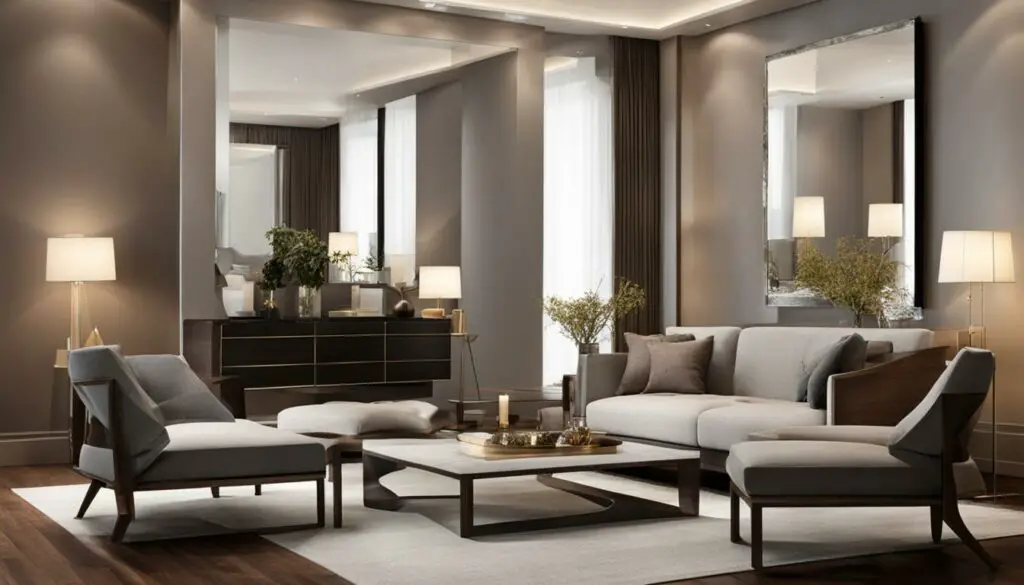
The Dos and Don’ts of Feng Shui Mirror Placements
When it comes to placing mirrors in your home according to Feng Shui rules, there are several dos and don’ts to keep in mind. By following these tips for placing mirrors in Feng Shui, you’ll be able to create a balanced and harmonious environment that promotes positivity and good energy flow.
Do:
- Place mirrors in rooms that have good lighting. Mirrors reflect light and help to amplify it, so having them in well-lit areas can enhance the energy flow.
- Use mirrors to reflect something beautiful or meaningful. This creates a positive and uplifting atmosphere in your home.
- Place mirrors in areas that need energy, such as a dark corner or a cluttered space. Mirrors can help to brighten up these areas and promote good energy flow.
- Hang mirrors at the correct height. The ideal height for a mirror is at eye level, allowing you to see your entire face while standing comfortably.
- Ensure mirrors are clear and undamaged. Broken or cloudy mirrors can reflect negative energy, so it’s important to keep them clean and in good condition.
Don’t:
- Place mirrors facing each other. This creates a “hall of mirrors” effect that can cause confusion and disrupt the energy flow in your home.
- Hang mirrors in narrow hallways or passageways. This can create a feeling of claustrophobia and impede the natural flow of energy in your home.
- Hang mirrors directly opposite the front door. This can push positive energy out of your home and lead to financial problems.
- Place mirrors in the bedroom that reflect the bed. This can disrupt your sleep and lead to restlessness.
- Hang mirrors in areas that reflect clutter or chaos. This can amplify negative energy and create a feeling of unease.
Following these tips for mirror placement in Feng Shui will help you to create a peaceful and harmonious environment in your home. By placing mirrors strategically and mindfully, you can enhance the flow of positive energy and promote a sense of well-being.
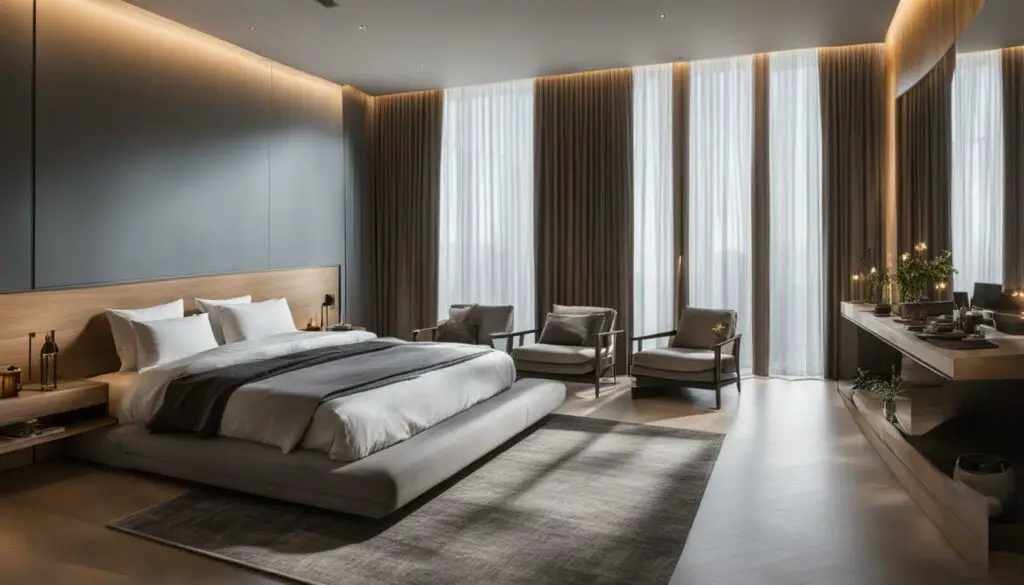
Mirror Placement in Feng Shui: The Entrance
The entrance area of your home is crucial in Feng Shui as it is where positive energy flows into your living space. The placement and direction of your mirror play an essential role in ensuring that the energy flows smoothly and harmoniously.
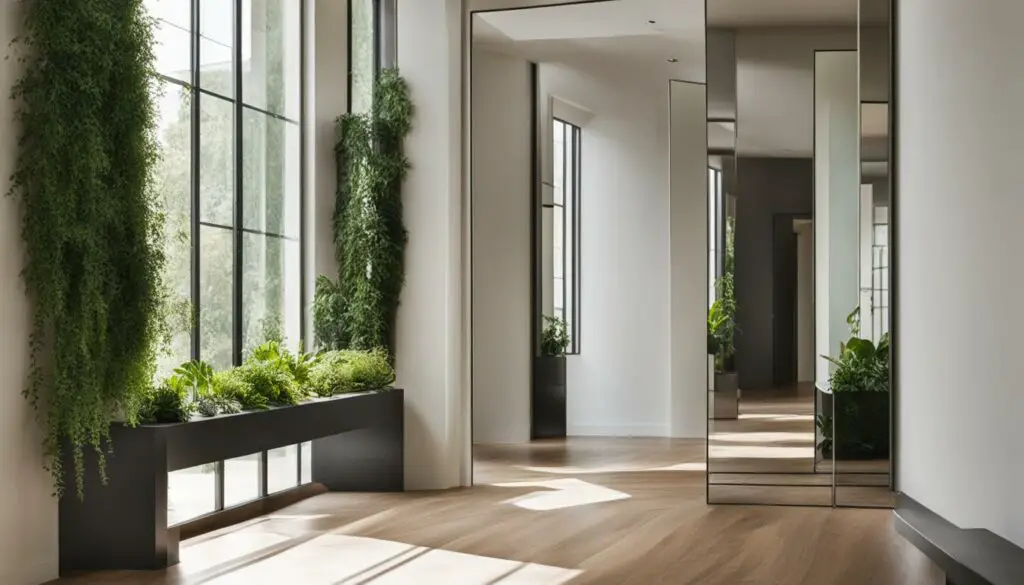
Ideally, your mirror should face the front door, reflecting the positive energy that flows in. It’s also essential that the mirror doesn’t directly face the front door, as this can cause energy to bounce out of the house. Instead, place the mirror at a slight angle or off to the side, allowing the energy to circulate freely throughout your home.
Another important consideration is the size of the mirror. Ensure that it’s proportional to the size of your entrance area. In Feng Shui, a large mirror can signify a desire to see opportunities and a reflection of abundance, making it a significant element in your entrance area.
Remember, the entrance area is the first impression visitors have of your home, so ensure that the mirror is clean and well-maintained. A dirty or damaged mirror can disrupt the flow of positive energy and create negative energy.
Example of Mirror Placement in Feng Shui: The Entrance
| Correct Placement | Incorrect Placement |
|---|---|
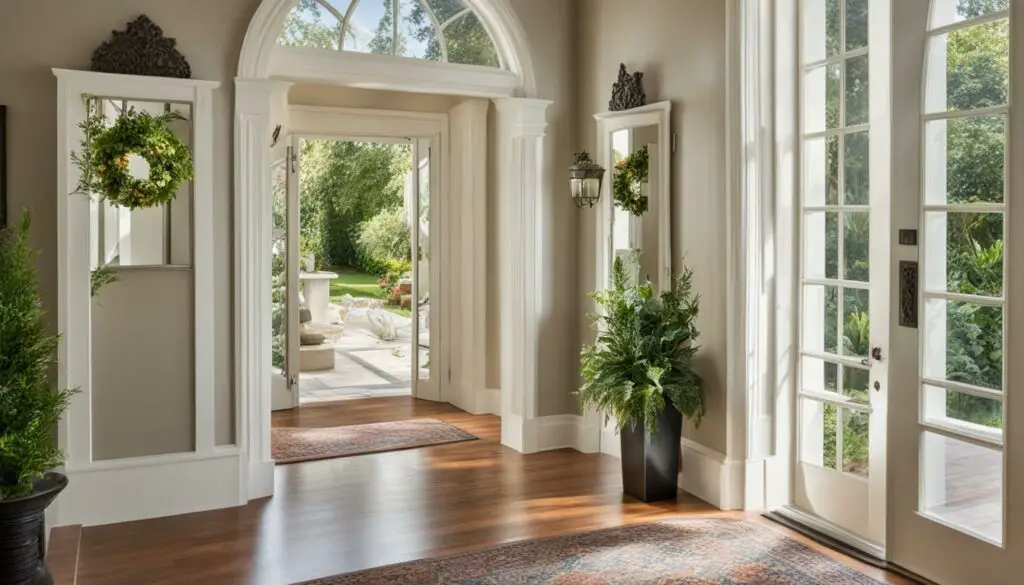 |
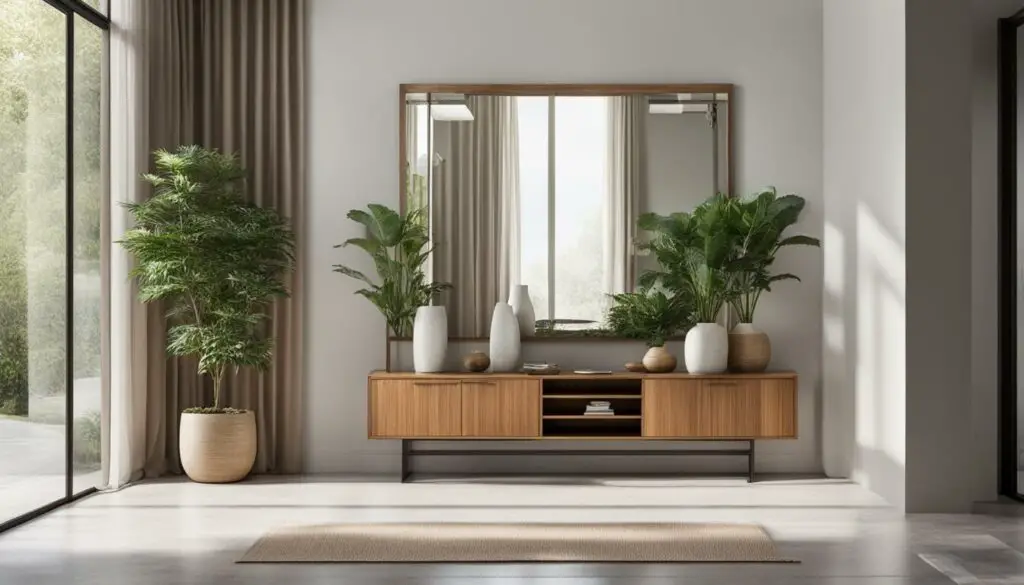 |
| A mirror placed at an angle to the front door to reflect energy and create a sense of openness. | A mirror directly facing the front door that creates a feeling of energy bouncing back out of the house. |
As you can see, correct mirror placement in Feng Shui can make a significant difference in the flow of energy within your home.
Mirror Placement in Feng Shui: The Bedroom
When it comes to Feng Shui, the bedroom is considered one of the most crucial spaces because it’s where you rest and recharge. The right mirror placement in this sanctuary can enhance relaxation, improve balance, and promote positive energy flow.
The first rule in Feng Shui mirror placement for the bedroom is to avoid any reflection of the bed. It’s believed that reflecting the bed in the mirror can cause restlessness and a lack of sleep. Instead, position the mirror in a way that doesn’t directly face the bed.
An excellent location for a mirror in the bedroom is on the closet door or wall opposite the bed. However, make sure the mirror doesn’t reflect the doorway, as it’s believed to cause anxiety and negative energy to enter the room.
Another important consideration is the size of the mirror. A massive mirror that overwhelms the space can create a feeling of discomfort and imbalance. Instead, choose a mirror that fits proportionally to the room’s size and complements the décor.
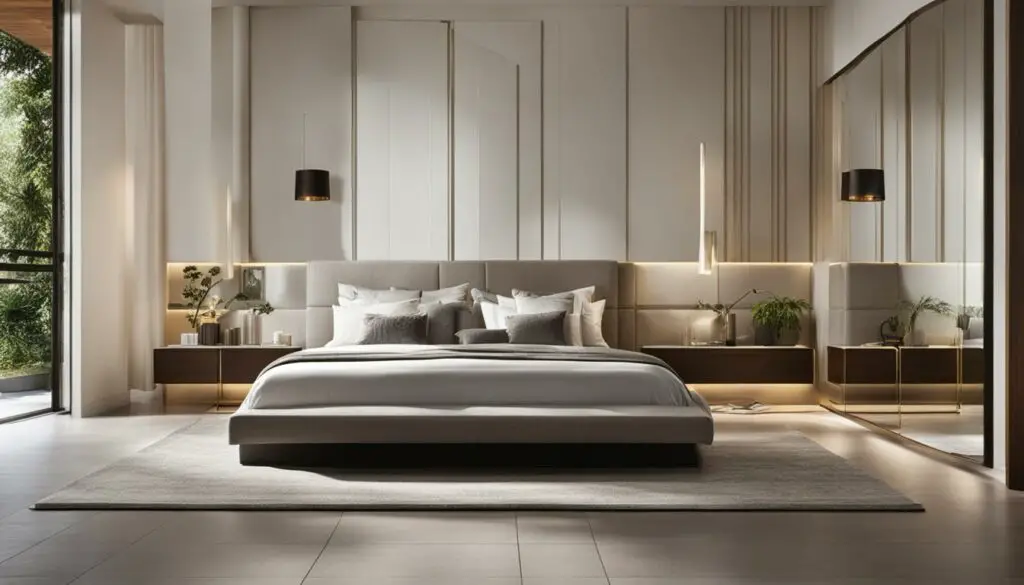
Finally, avoid placing mirrors facing the door or any sharp angles, as it’s believed to create negative energy that may affect your sleep and overall well-being.
Mirror Placement in Feng Shui: The Living Room
The living room is often the focal point of a home, where family and friends gather to relax and socialize. It’s important to create a welcoming and harmonious space, and mirror placement can play a significant role in achieving this goal.
Feng Shui Mirror Rules for the Living Room
When it comes to mirror placement in the living room, there are a few key Feng Shui mirror rules to keep in mind.
- Avoid placing mirrors directly facing the front door, as they can reflect the positive energy and opportunities that enter your space.
- Instead, position mirrors so that they reflect natural light and outdoor scenery, creating a sense of spaciousness and vitality.
- Mirrors can also be used to reflect and enhance positive energy flow within the room, such as positioning a mirror to reflect a beautiful piece of artwork or a vase of fresh flowers.
- Be mindful of the size and placement of mirrors in the living room, as they can easily overwhelm the space if they are too large or positioned in a way that creates visual clutter.
Keeping these Feng Shui mirror rules in mind can help you strategically place mirrors in your living room to create a sense of balance and harmony.
The Benefits of Feng Shui Mirror Placement in the Living Room
By incorporating mirrors in your living room according to Feng Shui principles, you can experience a range of benefits, including:
- A sense of spaciousness and openness
- Increased natural light and energy flow
- Reflection of positive artwork or decor
- Enhanced social connections and interactions
With thoughtful and mindful mirror placement, your living room can become a space of tranquility and positive energy flow.

Mirror Placement in Feng Shui: The Dining Area
The dining area is an essential part of your home, where family and friends come together and enjoy meals. Therefore, it’s important to create a harmonious and balanced environment. Incorporating mirrors in the dining area can amplify positive energy and promote abundance.
When it comes to mirror placement in the dining area, it’s essential to follow the principles of Feng Shui. Mirrors should never be placed directly in front of the dining table, as this can cause a confusing energy flow and disrupt the balance of the space.
Instead, consider placing a mirror on the wall adjacent to the dining table. This can reflect the table’s abundance and create a visually stunning effect. Another option is to place a mirror opposite a window, reflecting natural light and bringing an inviting energy to the dining area.
Mirror Facing
The direction in which your mirror faces is crucial in Feng Shui mirror placement. In the dining area, it’s best to have the mirror facing the table, reflecting the abundance of food and the company gathered around it.
Avoid having the mirror face the front door or any other negative elements, as this can cause a chaotic energy flow and disrupt the harmony of the space.
By following these simple guidelines, you can incorporate mirrors in your dining area to enhance abundance, promote healthy digestion, and create a more harmonious environment to share meals with your loved ones.

Mirror Placement in Feng Shui: The Bathroom
The bathroom is an essential part of the home, where we cleanse and refresh ourselves. When it comes to Feng Shui, the placement of mirrors in this room is crucial. Mirrors can help amplify positive energy and create a sense of tranquility and cleanliness.
The best location for mirrors in the bathroom is on the wall opposite the door. This placement allows the mirror to reflect the energy that enters the space, promoting a harmonious flow. Additionally, placing a mirror above the sink is an excellent way to help spread positive energy throughout the room.
When choosing the size and shape of the mirror, consider both aesthetics and functionality. A large, frameless mirror can create a sense of spaciousness, while a smaller, decorative mirror can add a touch of style and elegance. However, avoid placing the mirror too high or too low, as this can disrupt the balance of the room.
Mirrors and Water Elements
In Feng Shui, water elements represent purification, renewal, and vitality. Because the bathroom is where we use water to cleanse ourselves, it is considered a water element. Placing a mirror in the bathroom can help enhance the water element and promote positive energy flow.
Consider incorporating other water elements such as a small fountain or an aquarium to further enhance the energy in the bathroom. However, avoid placing mirrors directly facing water features, as this can cause the energy to flow out of the room instead of circulating within it.
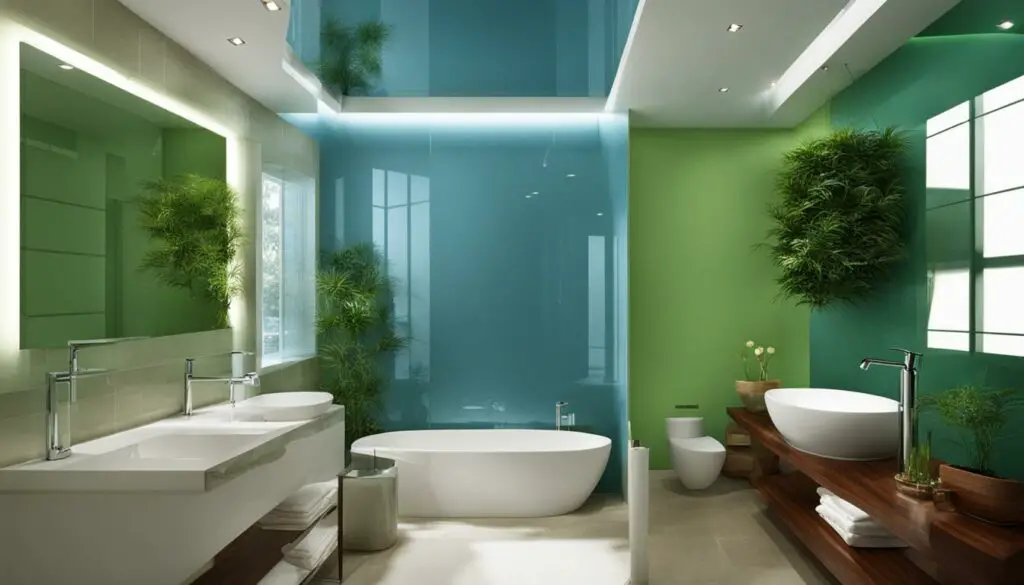
Placement Don’ts
When it comes to Feng Shui mirror placement in the bathroom, there are a few things to avoid. Firstly, never place a mirror directly facing the toilet. This can cause negative energy to reflect towards the mirror and spread throughout the room, affecting the energy flow.
Secondly, avoid placing a mirror directly opposite the bathroom door. This placement can cause the energy to flow too quickly out of the room, disrupting the harmony and balance.
By following these simple Feng Shui mirror placement guidelines, you can create a peaceful and harmonious bathroom environment, promoting positive energy flow and enhancing your overall well-being.
Mirror Placement in Feng Shui: The Home Office
The home office is where we focus on our professional goals and personal growth, so it’s essential to create an environment that promotes productivity, creativity, and success. Mirror placement in Feng Shui can help you achieve these goals by improving the energy flow in your workspace.
The Best Location for Mirrors in Your Home Office
According to Feng Shui principles, mirrors should be placed in a location where they can expand the energy flow in your office and reflect positive energy. One of the best locations for mirrors in your home office is behind your desk. This placement allows the mirror to reflect the energy of the room and promote a sense of clarity and focus.
Another optimal location for mirrors in your home office is opposite the window. This placement reflects natural light and enhances the overall brightness of your workspace. It also promotes a sense of openness and expands the energy flow throughout the room.
The Direction of Your Mirror in Your Home Office
The direction in which your mirror faces is also essential for maximizing its effectiveness in your home office. In Feng Shui, it’s best to avoid placing mirrors that reflect your desk or your back, as this can create a sense of restlessness and distract your focus.
Instead, consider placing your mirror so that it faces the door. This placement allows the mirror to reflect the energy that enters your office, promoting a sense of control and awareness. It also helps you avoid surprises and feel more in control of your surroundings.

“Mirrors can be powerful tools for promoting success and creativity in your home office. When used mindfully according to Feng Shui principles, they can enhance the overall energy flow in your workspace, improve your focus, and empower you to achieve your professional goals.”
Mirror Placement in Feng Shui: The Hallway
As one of the central areas of your home, the hallway is an essential space for applying Feng Shui principles. It is the space that connects different rooms; hence, it’s crucial to ensure a smooth flow of energy throughout this space.
When it comes to mirror placement in Feng Shui, the hallway provides an opportunity to create a sense of spaciousness and enhance the flow of positive energy throughout your home.
One of the most important Feng Shui mirror rules for the hallway is to choose mirrors that are proportional to space. Large mirrors should be avoided in narrow hallways, as they can overwhelm the space and cause energy to stagnate. Instead, opt for smaller mirrors that complement the size of your hallway.
The placement of mirrors in the hallway also plays a pivotal role in promoting positive energy flow. One of the best locations for a mirror in your hallway is at the end of the hallway. This creates the illusion of an extended space, promoting the flow of energy throughout your home.
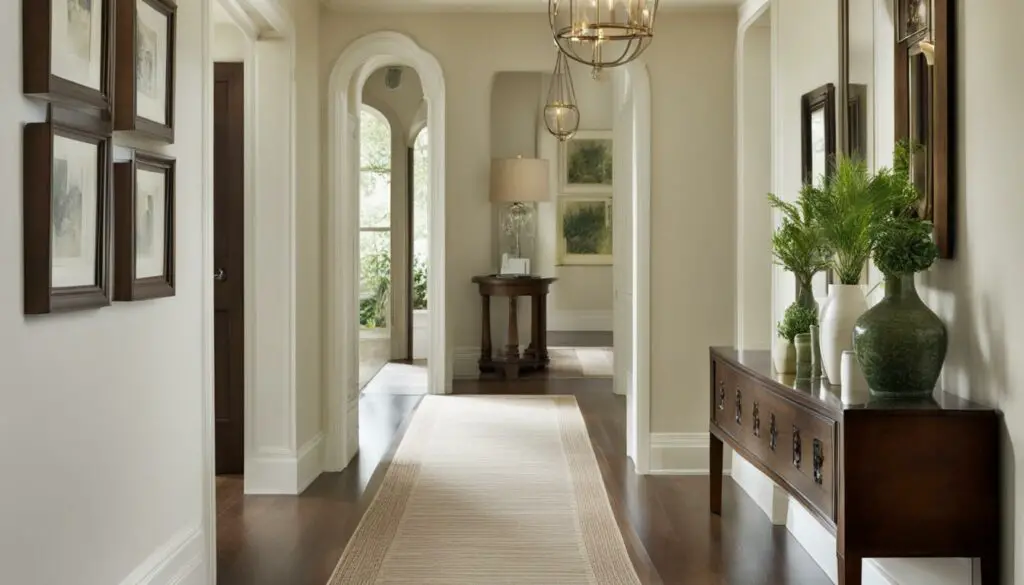
Another essential Feng Shui mirror rule to observe is to avoid placing mirrors opposite each other. This can cause energy to bounce back and forth, creating confusion and imbalance. Instead, consider placing mirrors on opposite walls or at right angles to each other to encourage the smooth flow of energy.
When placed correctly, mirrors in the hallway can also reflect natural light, making the space feel brighter and more inviting. However, be mindful not to place mirrors in direct sunlight, as this can cause the energy to become too intense and overwhelming.
Overall, a well-placed mirror in your hallway can create a harmonious and welcoming flow of energy throughout your home, helping to create a sense of balance and peace.
Mirror Placement in Feng Shui: The Outdoor Spaces
Placing mirrors in your outdoor spaces is an excellent way to enhance the energy flow and create balance. However, it’s important to be mindful of the placement and direction of the mirrors to avoid negative effects on the environment.
When placing mirrors in your garden or outdoor living space, ensure that they reflect natural elements such as trees, flowers, or water features. This will amplify the positive energy and promote a sense of tranquility and relaxation.
Another way to incorporate mirrors in your outdoor spaces is to use them strategically on walls or fences to create the illusion of more space and reflect light. This technique can be particularly useful for smaller outdoor areas.
However, it’s important to note that mirrors should not be placed directly facing each other or reflecting negative elements such as clutter or sharp objects. This can create stagnant energy and disrupt the flow of positive energy in your space.
Tips for Placing Mirrors in Feng Shui
When placing mirrors in your outdoor spaces, keep these tips in mind:
- Avoid placing mirrors facing each other
- Reflect natural elements such as trees, flowers, or water features
- Use mirrors to create the illusion of more space and reflect light
- Avoid mirrors reflecting negative elements such as clutter or sharp objects
By following these simple tips, you can enhance the energy flow in your outdoor spaces and create a balanced and harmonious environment.

Conclusion
Mastering the art of Feng Shui mirror placement requires mindfulness, patience, and attention to detail. By following the principles and guidelines discussed in this article, you can enhance the flow of positive, harmonious energy within your living space. Remember to consider the direction of your mirrors, the locations where they are placed, and their overall impact on your environment.
Final Thoughts on Feng Shui Mirror Placement
Ultimately, the goal of incorporating mirrors into your home according to the principles of Feng Shui is to create a sense of balance, tranquility, and overall wellbeing. Whether you are placing mirrors in your bedroom, living room, bathroom, or outdoor spaces, be mindful of their impact on the energy flow and ensure they reflect positive energy.
Experiment with various mirror placements until you find the optimal arrangement that resonates with your personal preferences and aligns with your unique living space. When used correctly, mirrors can enhance the natural beauty of your home and promote a sense of serenity and harmony that will benefit your overall wellbeing.
FAQ
How do I place mirrors in Feng Shui style?
To place mirrors in Feng Shui style, ensure they are positioned to reflect positive energy and enhance the flow of chi. Avoid placing mirrors directly facing the main door or bed, and instead, position them to capture natural light and expand the space.
What are the principles of Feng Shui mirror placement?
The principles of Feng Shui mirror placement involve creating balance and harmony. Mirrors should be used to reflect light and natural elements, such as greenery or water. They should not reflect clutter or create sharp angles that disrupt the energy flow.
How does mirror direction affect energy flow in Feng Shui?
Mirror direction plays a significant role in Feng Shui as it can enhance or disrupt the flow of energy. Mirrors should be positioned to redirect and circulate positive chi throughout the space, avoiding reflecting negative or stagnant energy.
What are some dos and don’ts of Feng Shui mirror placements?
Some dos of Feng Shui mirror placements include using mirrors to create a sense of space, reflecting natural light, and positioning them to enhance positive energy flow. Don’ts include placing mirrors directly facing each other or reflecting cluttered areas.
How should I place mirrors in the entrance area of my home?
When placing mirrors in the entrance area, make sure they don’t directly face the main door. Position them to reflect natural light and create a sense of openness. Avoid placing mirrors that reflect negative or cluttered spaces.
How can I incorporate mirrors in my bedroom for Feng Shui?
To incorporate mirrors in your bedroom for Feng Shui, avoid placing them directly facing the bed or reflecting the body while sleeping. Position mirrors to reflect natural light, create a sense of spaciousness, and promote a harmonious atmosphere.
What is the best way to strategically place mirrors in the living room?
Strategically place mirrors in the living room to reflect natural light, create a sense of spaciousness, and enhance positive energy. Avoid positioning mirrors that reflect clutter or create sharp angles. Consider placing mirrors on walls perpendicular to windows or near sources of light.
How can mirrors be used in the dining area for Feng Shui?
Mirrors can be used in the dining area of your home to reflect abundance and promote healthy digestion. Position mirrors to enhance the dining experience and create a sense of abundance. Avoid placing mirrors that reflect the dining table or guests directly.
What is the optimal placement of mirrors in the bathroom according to Feng Shui?
In the bathroom, place mirrors to amplify positive energy and reflect cleanliness. Avoid placing mirrors that reflect toilets or drains. Position them strategically to enhance natural light and create a tranquil atmosphere.
How can I incorporate mirrors in my home office for Feng Shui?
Incorporate mirrors in your home office to enhance productivity and success. Position mirrors to reflect natural light, expand the space, and promote creativity. Avoid placing mirrors that reflect distractions or create visual clutter.
How should I place mirrors in the hallway for optimal Feng Shui?
Place mirrors in the hallway to create an inviting and harmonious flow of energy. Position them to reflect light and expand the space. Avoid placing mirrors that reflect cluttered or cramped spaces.
Can I use mirrors in my outdoor spaces for Feng Shui?
Yes, mirrors can be used in outdoor spaces to reflect positive energy and create balance. Position them to reflect natural elements, such as greenery or water. Avoid placing mirrors that reflect negative or stagnant energy.
